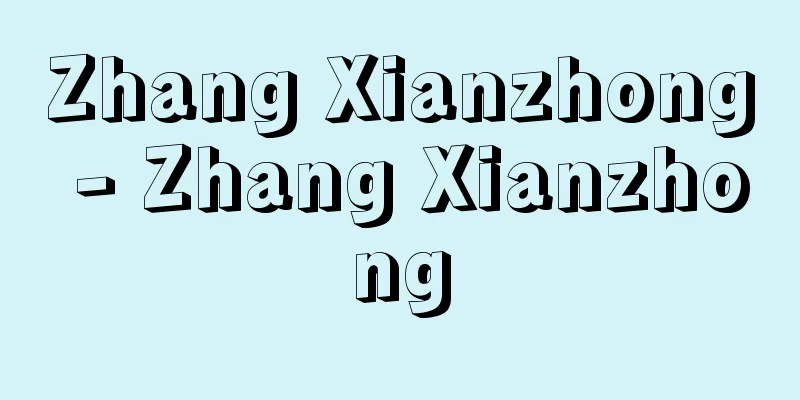Zhang Xianzhong - Zhang Xianzhong

|
He was the leader of a rebellion that took place during the Chongzhen period (1628-1644) in the late Ming Dynasty in China. He was born to a poor peasant family in Yan'an, Shaanxi Province. He served as a garrison soldier in Yansui Town for a time, but in 1630 he led the peasants of Miji County in an uprising, calling himself one of the Eight Great Kings. He fought in Henan, Hubei, and Anhui, fighting in close ties with the peasant armies of each region. He entered Sichuan but was unsuccessful, so he turned around and captured Wuchang in 1643, calling himself King of the Great West. The following year he advanced into Sichuan again, taking Chongqing and Chengdu, ascending to the throne and establishing the Great West Kingdom, naming the era name Dashun and Chengdu Xijing, and becoming a leader on a par with Li Zicheng, who was active in northern China at the time. After the founding of the state, he also conquered Hunan and Jiangxi, imposing strict military discipline and forbidding murder and violence. He also exempted serfs from taxes for three years, freed serfs, and organized a women's unit called the "Ladies' Army" to recognize women's rights, attracting peasants with innovative policies. However, he lost the support of small and medium-sized landlords and scholar-court officials, and was unable to form an alliance with Li Zicheng. He was oppressed by the landlords of Sichuan who responded to the Qing army's advance south, and after resisting for three years, he was killed in battle. [Hoshi Hideo] Source: Shogakukan Encyclopedia Nipponica About Encyclopedia Nipponica Information | Legend |
|
中国、明(みん)末、崇禎(すうてい)年間(1628~44)の反乱の首領。陝西(せんせい)省延安の貧農に生まれる。一時、延綏(えんすい)鎮の守備兵となったが、1630年米脂(べいし)県の農民を率いて決起、八大王を称し、各地の農民軍と不即不離の関係をもって、陝西から河南、湖北、安徽(あんき)に転戦。四川(しせん)に入ったが利あらず、反転して43年、武昌(ぶしょう)を攻略、大西王と称した。翌年ふたたび四川に進み、重慶(じゅうけい)、成都を落とし、ここで帝位につき大西国を建て、元号を大順、成都を西京(せいけい)とし、このころ華北に活躍していた李自成(りじせい)と並ぶ首領となった。建国後、湖南、江西も攻略し、軍規を厳しくして殺傷暴行を禁じた。また、3年間租税を免除し、農奴を解放、婆子(ばし)軍という婦人部隊を編成して婦人の権利を認めるなど、目新しい政策で農民をひきつけた。しかし、そのために、中小地主、士太夫の支持がなく、李自成と連合することもできず、清(しん)軍の南下に呼応した四川の地主らの弾圧を受け、3年間抵抗したが戦死した。 [星 斌夫] 出典 小学館 日本大百科全書(ニッポニカ)日本大百科全書(ニッポニカ)について 情報 | 凡例 |
<<: Common Kestrel (Chogenbo) - Common Kestrel
Recommend
Ahimsa (English spelling) ahiṃsā
Not to kill, not to harm. One of the important ide...
Dyophysiology
…Apollinarius, who denied the perfection of Chris...
Oar Bridge - Oarkyo
…For example, in the case of Al, the formula is a...
Andree, W.
... Early excavations were mainly carried out at ...
Kannongatake
...A mountain located in the western part of Yama...
Asthenosphere
A hot, fluid layer in the upper mantle region of t...
Hyatt, A. (English spelling) HyattA
...In America, A. Packard advocated neo-Lamarckis...
Wajiki [town] - Wajiki
A former town in Naka District, southeastern Tokus...
OSA - OSA
An interface developed by Apple Inc. that connects...
Bartlett, N.
...Ferrocene, in which an iron atom is sandwiched...
Kahiko - Kahiko
… [Hiroshi Aramata] [Eggs and the Japanese] The r...
Ara macao (English spelling) Aramacao
...There are about 15 species distributed around ...
Wicken Fen - Wicken Fen
…Because of its unique history, a dialect close t...
egofuturizm
...In Russian, it is called futurizm. Four main g...
Facial lines
…The transverse groove just before the cervical r...









